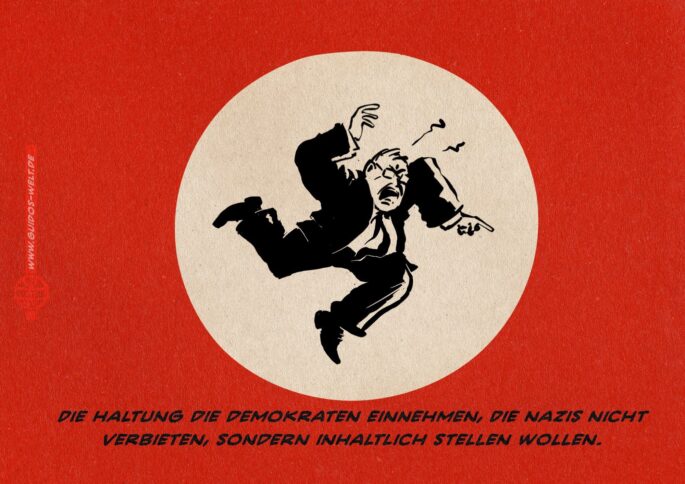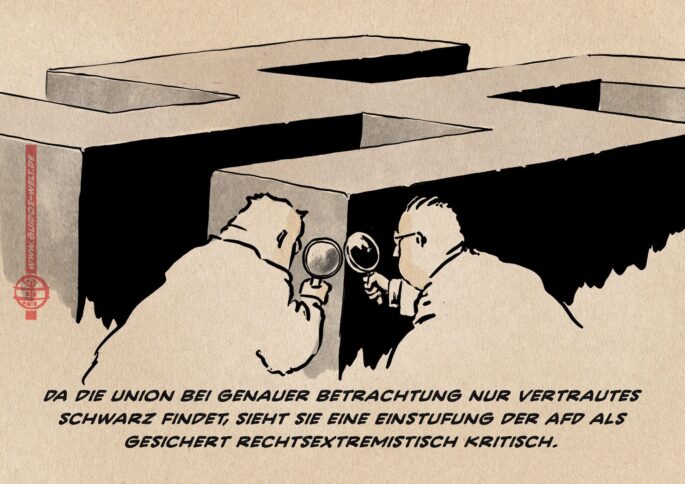Guido Kühn is a professor of media design and cartoonist. He posts regularly on social media Cartoons that deal with everyday political life in Germany. These include those who criticize the shift to the right in the country. Some of these cartoons contain swastikas.
Several people have now found themselves facing criminal charges because of one of these cartoons. You shared a cartoon by Guido Kühn on Facebook that deals with the debate about gender-equitable language. It shows the word “Deutsche*r” in Fraktur script, with a swastika instead of the gender star. Below it says: “Breakthrough in the language dispute: Surveys show the shape of the gender asterisk that the majority of Germans would agree with.”
According to the responsible public prosecutor’s office: Use of symbols of unconstitutional organizations.
No investigations against the artist
How the advertisements came about can only be partially reconstructed. In one case, a hate and hate speech reporting center forwarded a posting containing the cartoon to the police. The person affected reported this to netzpolitik.org. Another person affected says he doesn’t know who initiated the report and he hadn’t inspected the files.
Also exciting: There are no known investigations against the cartoonist Kühn himself, only against followers who shared his cartoons. According to lawyers, this is because artistic freedom applies to the artist. But if followers then share the content, it no longer applies. Kühn says he is aware of at least five investigations against people who are facing criminal charges because of his cartoons. netzpolitik.org spoke to two of those affected.
Several people have received criminal charges because of this cartoon. It shows the word “Deutsche*r” in Fraktur script, with a swastika instead of the gender star. Below it says: “Breakthrough in the language dispute: Surveys show the shape of the gender asterisk that the majority of Germans would agree with.”
Warning: Sharing this cartoon may result in criminal prosecution.

Cartoon against the shift to the right. Inscription: “The attitude that Democrats take, who do not want to ban the Nazis, but want to present the content.”
Warning: Sharing this cartoon may result in criminal prosecution.

Cartoon against the shift to the right. Two men look at a large swastika with a magnifying glass. Below it says: Since, upon closer inspection, the Union only finds familiar things black, it is critical of classifying the AfD as definitely right-wing extremist.”
Warning: Sharing this cartoon may result in criminal prosecution.
House search because of caricature
Lorenz Müller* is one of them. He shared the picture on Facebook and distanced himself from the swastika in the text under the picture. That didn’t do him any good. At the beginning of January 2024, two plainclothes officers stood at his front door with a search warrant, inspected the apartment and confiscated a tablet.
“The officers seemed more like they were embarrassed by the search,” says Müller. The officers see left-wing books and posters in his apartment, and it quickly becomes clear that there is no Nazi at work here. However, he only got his tablet back months later; according to Müller, the proceedings were discontinued upon payment of a fine of 300 euros.
“Desperate, horrified and intimidated”
Manja Schneider* also received mail from the police and was summoned. She canceled the appointment, hoping that the matter would sort itself out. In July she received a penalty order: a fine of 15 daily rates of 50 euros each, a total of 750 euros. “I was desperate, horrified and intimidated,” Schneider told netzpolitik.org.
Schneider has never had to deal with the police or courts in her life. She doesn’t want to challenge the sentence, but on the advice of her lawyer, she writes a personal letter to the judge in which she explains herself. The court initially viewed the letter as an objection, and Schneider would have had to appear in court at the end of November. Then the proceedings were discontinued, with a fine of 600 euros. Schneider now wants to pay the amount so that even higher costs do not arise.
Manja Schneider finds the process inappropriate. She is committed to fighting right-wing radicalism and sees herself as a convinced anti-fascist. That’s why she’s so heartbroken that she of all people should now be guilty of “spreading propaganda from unconstitutional organizations.”
Schneider did not take part in the proceedings so that even higher costs would not arise. Another who tried to go to court was punished even more harshly. Kühn reports on another case that was heard on Thursday in Saxony: Here a court sentenced a person to a fine of 1,000 euros because he had shared one of his caricatures. There are also court and legal fees.
Punishable even without a positive connection
The chances of people who spread caricatures with swastikas of going completely unpunished are apparently slim. This is also what Peer Stolle, criminal defense attorney and chairman of the Republican Bar Association (RAV), says. The swastika is not protected as a means of criticism. It is fundamentally forbidden unless there is clear rejection, such as a crossed-out swastika or the symbol where the swastika is thrown into a trash can. “There is no need for a positive connection for criminal liability,” Stolle continued. However, those affected could usually expect a lower sentence in court if an anti-fascism stance was evident.
Fulda University has prepared a previously unpublished report on Kühn’s gender star caricature. This states that artists have repeatedly used the swastika as a provocation, warning or aesthetic element. In the case of the gender star swastika caricature, Kühne “connects areas of conflict” and encourages the viewer to explore the connecting causes of conflict.
In the best case scenario, this creates resilience. The artist succeeded in this. Because “even the attempts to turn this work into the opposite interpretation by means of an advertisement” should be understood here as evidence that Kühn’s basic assumption “of a society that is under considerable stress and longs for clarity” is correct. The report concludes: “There is therefore definitely no glorifying representation of National Socialist symbolism.”
“Grotesque Threat Scene”
Guido Kühn himself sees the procedures as strategically motivated: The aim is to “suppress formally legitimate opinions and attitudes by putting defendants under considerable financial and human pressure through threats, sometimes grotesque, house searches and similar measures.”
Proceedings would now be stopped without a trial in exchange for punishment, i.e. “knocked down without a verdict,” as he calls it, “since very few of those affected have the time, money and nerves to go through the courts.” In return, reporting offices or public prosecutors would not have any personal risk.
Kühn says that he has received feedback from people telling him that although they think his work is important, they ask him to continue. At the same time, they would sincerely apologize that they would not comment, like or share his artworks in the future due to the risk of litigation. This suppresses an “absolutely necessary public debate,” criticizes the artist.
*Name changed, real name known to the editors

